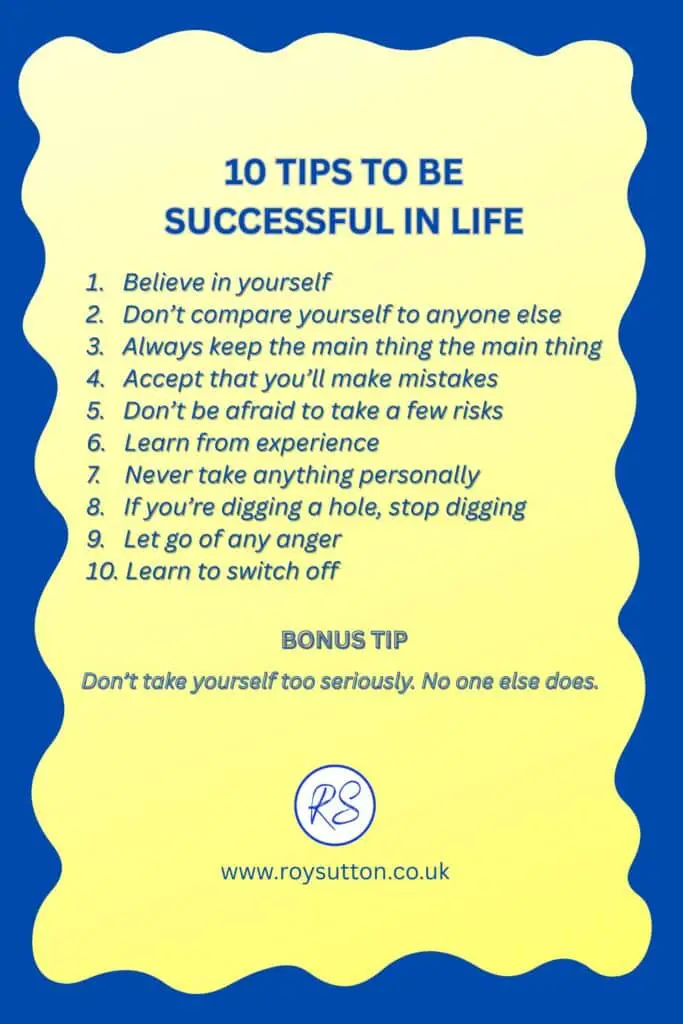
Looking for some useful tips to be successful in life, dear reader? What habits should you develop? Today, I present to you my top 10 list.
What’s the key to success?
Well, I can tell you right now that there’s no one, single thing that on its own will ensure that you enjoy some personal success. There’s no silver bullet, I’m afraid.
However, there are things you can do and habits you can develop that will help you to become the successful person you really could be.
Dear reader, you can be successful, and it’s never too late. Other people succeed, so why not you?
Know what you want and know why:
Essentially, success comes from knowing what you want and knowing why.
If you establish some goals and take a disciplined approach towards achieving those goals, then you’re on your way.
However, you’ll also need to adopt some good habits that will help you achieve those goals and help you to keep going until you get to where you want to be.
Adopting good habits will also mark you out as a role model for others, which means you’ll be a leader.

Tips to be successful in life:
Here is my list of the top 10 tips to be successful in life.
These are good habits you really ought to consider developing from now on:-
1. Believe in yourself:
You must believe in yourself, dear reader. That’s a given if success is your aim. If you don’t believe in yourself then why would anyone else believe in you?
If you lack self-belief, then you must start reinforcing a belief in yourself straightaway with a daily mantra.
Every morning and every evening, go to your bathroom mirror and repeat the following to yourself 10 times each time:-
“I’m as good as anyone, and I’m better than most. I will be a success.”
You must remind yourself of this constantly.
Self-belief is an essential ingredient if you’re going to succeed. Reminding yourself that you’re as good as anyone will help reinforce self-belief in both your conscious and subconscious minds.
Believing in yourself and your ability to succeed is more important than anything else. It is if success is your aim, I can tell you that from experience.
2. Don’t compare yourself to anyone else:
You are who you are, and you can only be the person you are. Anything else would be a fake.
You have your own special qualities and no one else on earth is quite like you. You have your own strengths and of course, you have a few weaknesses too. Everyone does.
Other people have their own unique qualities too, of course. However, that doesn’t mean they’re better than you.
They’re just different. You can’t be them, so don’t try. And they can’t be you either. So concentrate on being yourself. Everyone else is taken.
If you want to be a star, then you must shine for being you and for the special magic that only you can bring to this world. You’re unique, so take pride in that and put your best foot forward.
Never compare yourself to anyone else, and never fret if you feel that you can’t match someone else in some particular way. Remember, there will be ways in which they cannot match you either.
3. Always keep the main thing the main thing:
Whether you like it or not, you’ll be judged by what you deliver and the value you add.
If your job is to paint my house, then I will judge you on how well you’ve painted my house.
I don’t care how much help you might have given to my neighbour. If you’ve painted my house badly or the job hasn’t been done properly, then you’ve failed as far as I’m concerned. Do the job badly and I will not be happy.
Often in the workplace, our inability to say “No” leads us to be completely distracted by a request to help someone else.
And that distraction can result in us failing to do something that would have moved us closer to the successful conclusion of one of the goals we’ve set for ourselves.
Losing sight of our own high-value tasks can make us less productive and less valuable in the eyes of our employers. Workplace distractions can lead to us helping other people achieve their objectives at the expense of our own if we’re not careful.
Being a team player is important, of course, and there will be occasions when assisting a colleague is the right thing to do for the greater good of the team. However, it should never, ever be at the expense of you delivering what you will be expected to deliver, regardless.
You’re judged by what you deliver, so never lose focus on what you’re expected to do.
Never be afraid to be assertive. You don’t have to be chippy, unpleasant or impolite. You just have to say something like, “Look I’m really sorry, I would love to help you but I have this to complete by 5 pm” or whatever.
Remember, appearing to be reasonable is much better for you than trying to be too reasonable.
Always, always keep the main thing the main thing.
Being too helpful may help others, but it probably won’t help you.
It will, however, increase your stress levels if you’re not careful.
Focus on your own goals ruthlessly.
4. Accept that you will make mistakes occasionally:
No professional likes to make mistakes.
Nevertheless, they are inevitable occasionally. That’s a fact of life.
No one is so perfect that they can avoid mistakes completely. And no one ever achieved anything without making a few mistakes along the way.
So it’s fine to make mistakes occasionally, provided you don’t make too many and provided you don’t make the same mistakes repeatedly.
When you’ve made a mistake, it’s important to be honest, accept it, and above all, learn from it.
Making mistakes is all part of us gaining that valuable commodity known as experience.
So just do your best and accept that, like everyone else, you’re not perfect, nor will you ever be.
However, remember this: just because you’re not perfect, it doesn’t mean you cannot be exceptional at what you do. As professionals, we always strive to get better at what we do.
Mastery of your craft is a worthy aim and one that requires constant study and practice, and occasionally making mistakes.
5. Don’t be afraid to take a few risks:
Risk and reward go hand in hand. You can’t have one without the other.
You’ll never achieve anything exceptional if you always play it safe. Well, not unless you’re very, very lucky anyway.
Sometimes you just have to follow your instincts and go for it.
That doesn’t mean you shouldn’t weigh up the pros and cons before you take action. It’s fine to consider the potential consequences before you take a risk. Equally, it’s fine to consider the odds of achieving a positive outcome and whether the potential reward merits the degree of risk involved.
Consider risk carefully, but don’t dwell on it too long. Analysis shouldn’t replace action. You cannot get to second base unless you take your foot off first base and go for it.
And anytime you take a risk, don’t panic if initially, things don’t go quite as you’d imagined.
If you’ve used your judgement with care, then there’s every possibility that you’ll get the outcome you want.
So hold your nerve and just believe in yourself.
You may not get it right every time, but you’ll get it right more than you get it wrong. And even when you’re wrong, you’ll learn a lesson.
Get it right and you’ll be that much closer to achieving a goal.
So be willing to take a calculated risk when necessary.
6. Learn from experience:
As suggested earlier, experience is a valuable commodity.
It’s the by-product of making mistakes and taking risks. It’s the invaluable benefit we derive when things don’t quite work out as we’d intended.
The most important thing about experience is that we learn from it.
And of course, we can learn from seeing others make mistakes, too, as well as from anything we’ve done ourselves.
The lessons we get from real experience are far more valuable to us than anything anyone can tell us, or anything we can read in a book for that matter.
It’s the education we get at the University of Life and the School of Hard Knocks.
However, remember this: you don’t owe anyone an explanation for your mistakes.
When you make a mistake, it makes sense to be honest with yourself and others, of course. Beyond that, you should not feel the need to explain yourself in detail.
Mistakes happen, and no one starts with the intention of getting something wrong. If you get an outcome you didn’t want, then just take it on the chin, learn the lesson, and move on.
Everyone makes mistakes occasionally, and you’re no different. To err is human. That’s life.
7. Never take anything personally:
The French philosopher Jean-Paul Sartre once observed that “Hell is other people.”
I’m sure there are times when we all feel that he may have had a point.
We’re all struggling to get through life as best we can, and life’s never easy for anyone. Everyone wants what they believe to be their fair share of life’s ‘pie’. Some people want your share too.
Sometimes that can leave us feeling like everyone is giving us grief and deliberately making life more difficult than it needs to be.
However, mostly in our dealings with people, there’s nothing personal.
Life is just ‘dog-eat-dog’. People may be a little insensitive at times, as they pursue their own agenda, but generally, they’re not out to hurt us specifically.
So if it’s not personal, then never take it personally.
And on those rare occasions when it does prove to be personal, don’t give them the satisfaction of a reaction or showing that they’ve got to you.
Look them in the eye and show them that it doesn’t bother you. Your message has to be:
“I’m made of steel. You’ll have to try harder than that if you’re going to penetrate my shield.”
8. If you’re digging a hole for yourself, stop digging:
When you realise you’re digging a hole for yourself, you have two choices:-
- You can keep digging, and the hole in which you find yourself will simply get bigger and more problematic; or
- You can recognize the situation for what it is and stop digging immediately.
It is always best to stop digging immediately, in my experience.
When you stop digging, you might have a few fences to mend, of course.
Certainly, you’ll have to accept responsibility.
And you’ll probably have to apologize to some people, depending on the circumstances.
Regardless of what it all means, it’s always better to recognize a bad situation for what it is and take it on the chin, rather than making everything even worse.
On the positive side, having the ability to recognize when you’re digging a hole for yourself and having the maturity to deal with the consequences is a sign of self-confidence. That’s something for which you’ll gain other people’s respect.
In my experience, people will respect you if you’re prepared to say, “Hey, you know what, I’ve made a bit of a mess of this one, so I’ll stop right here and let’s try again. Sorry but like everyone else, I’m not perfect and I make mistakes occasionally.”
Just because you didn’t quite get it right doesn’t mean you cannot show confidence in how you respond.
Respond in the right way, and your confidence will be well placed.
9. Let go of any anger:
We all get angry occasionally, but anger never gets you anywhere worth going.
React in anger, and almost certainly you’ll regret it.
That’s not to suggest that you should not react at all. However, before you react, let the anger subside. Just let it go.
Leave it for 24 hours if necessary, until you’re better able to reflect with a calm head. There’s a lot to be said for ‘sleeping on it’ in my experience.
That way, you’re better placed to use your judgement carefully and make rational decisions.
In making decisions, revenge should not form any part of how you plan to react.
Revenge won’t get you to any place worth going, either, and you’ll almost certainly regret that too.
10. Learn to switch off:
We all need a little ‘me time’ regularly, otherwise, we’ll burn out.
We all need time to relax and recharge our batteries.
That means switching off completely.
By doing that, one of the great benefits is that we gain a fresh perspective on whatever’s happening in our lives.
Surprisingly, perhaps we’ll also get plenty of new ideas in the process.
In fact, you’ll find you get some of your best ideas when you’re not trying to come up with new ideas. That’s ironic, I know, but it’s true, in my experience.
Bonus tip:
Don’t take yourself too seriously. No one else does.
If you can’t laugh at yourself occasionally, you might just be missing out on the funniest thing happening at that moment. Why miss out on a good laugh?
When you’re working, take your job seriously, but never yourself.

Concluding remarks:
So there you have it. If you want to be successful, start by developing good habits.
This list of tips would be a good start, but you will find that there are plenty of others too.
Above all else, make sure you’re adding value to everything you do. Our purpose in life should be to add value to the lives of others.
If you’re adding genuine value, then you can’t go too far wrong.
So, dear reader, where do you add the most value, and what are your goals?
You should know the answers to these questions, and you should write them down.
If you don’t know, it’s time to find some answers.
Nothing ever happens by accident. You have to make it happen.
You can be successful, everyone can, but it requires you to know where you’re going; to know why you’re going there, and to be prepared to work very hard until you get there.
You can do it, dear reader. So, good luck!
Please share this post with your friends:
If you found this article useful, then please share it on social media with your friends.
When you share, everyone wins.
Please share it now, and I’ll be ever so grateful. You’ll be helping a keen blogger reach a wider audience.
Thank you for your support.
Articles you might also find interesting:
- Brian Tracy: Habits of success anyone can learn
- The importance of making mistakes to achieving success
- The importance of friends to our lives
- 15 Quotes by Barbara Sher to inspire you
- 15 quotes to emphasize the importance of time management
- Goal-setting and how to achieve them
- Why you should let your child fail and make mistakes
- Why your personal philosophy for life really matters
- 25 facts of life that might get you thinking
- 8 Top Business Tips for Success Today
- 10 tips for improving self-esteem
- Why passion is the key to success
- How to handle criticism at work effectively
- 3 ways for getting rich
- 5 ways to kill your dreams
- 33 life lessons learned that are best learned early
- How the power of words can change lives
- 10 steps for making new year’s resolutions
- Public Speaking: The Power of the Pause
- Productivity Tips: How to Structure Your Day
- George Carlin’s Top 10 Rules For Success
- 13 tips for improving your personal happiness
- Steve Jobs’ Top 10 Rules For Success to inspire you
- 25 inspirational stories of people going from rags to riches
© Mann Island Media Limited 2025. All rights reserved.







